conflict
Why the financial theft of the Ukraine war may finally be coming to an end
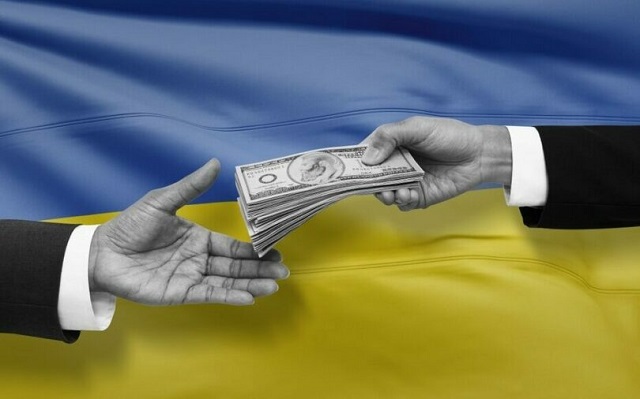
From LifeSiteNews
Ukraine has suffered so many losses that military conscription law has been altered to allow women to be called in to service.
STORY AT-A-GLANCE
- For years, Ukraine was recognized as one of the most, if not “the” most, corrupt nation in Europe. The country is now struggling to rein in corruption as that is becoming a key hurdle to obtain more financial support.
- According to official aid trackers, the U.S. had sent $76.8 billion in military, financial, and humanitarian aid to Ukraine as of the end of July 2023. The European Union contributed another $85.1 billion in that same timeframe. In mid-October 2023, Biden proposed yet another $105 billion foreign aid package, $61 billion of which will go to Ukraine.
- According to U.S. officials, at least 70,000 of Ukraine’s 500,000 troops had been killed by mid-August 2023, and another 100,000 to 120,000 wounded. Another 9,614 Ukrainian civilians had also been killed as of September 10, 2023.
- The supply of cannon fodder is running so low that Ukraine recently updated its conscription law to include women. Women between the ages of 18 and 60 with medical backgrounds must register for military service as of October 1, 2023.
- Corruption may be a primary driver of this war. The American public being robbed and Ukraine drained of its youths while a relatively small number of corrupt individuals stuff their pockets with cash. American and European taxpayers are paying for the destruction of Ukraine and the elimination of huge numbers of its inhabitants, so that technocrat globalists and central bankers can then profit from the privatization and rebuilding of Ukraine into a “smart country” model for the rest of the world.
(Mercola) — For years, Ukraine was recognized as one of the most, if not “the” most, corrupt nation in Europe. It held on to that reputation all the way up to the day Russia invaded in late February 2022, at which point media worldwide suddenly started rewriting history.
As noted by Ted Galen Carpenter, a senior fellow for defense and foreign policy studies at the Cato Institute, in a sober and clear-eyed article, published in April 2022:
Statements from U.S. and other Western officials, as well as pervasive accounts in the news media, have created a stunningly misleading image of Ukraine. There has been a concerted effort to portray the country… as a plucky and noble bulwark of freedom and democracy…
The notion that Ukraine was such an appealing democratic model in Eastern Europe that the country’s mere existence terrified Putin… is a myth… Even before the war erupted, there were ugly examples of authoritarianism in Ukraine’s political governance …
The neo-Nazi Azov Battalion was an integral part of President Petro Poroshenko’s military and security apparatus, and it has retained that role during Zelensky’s presidency…
The country is not a symbol of freedom and liberal democracy, and the war is not an existential struggle between democracy and authoritarianism. At best, Ukraine is a corrupt, quasi‐democratic entity with troubling repressive policies.
Given that sobering reality, calls for Americans to ‘stand with Ukraine’ are misplaced. Preserving Ukraine’s independence and territorial integrity most certainly are not worth the United States risking war with a nuclear-armed Russia.
Indeed, while President Joe Biden kept sending tens of billions of American taxpayer dollars to Ukraine in the name of “defending democracy,” Zelensky banned all opposition parties in the country and blacklisted American politicians and journalists who questioned the U.S. involvement in the conflict. So much for democracy and democratic values.
Is Ukraine aid part of a money laundering scheme?
According to the Panama Papers released in 2016, which have been described as “a giant leak of more than 11.5 million financial and legal records [which] exposes a system that enables crime, corruption and wrongdoing,” Zelensky is likely just as corrupt as his predecessors, as he, his wife and several associates all own “hidden offshore assets.”
With that in mind, why is the U.S. sending billions of dollars to Ukraine without requiring any kind of accounting for where all this money is going? According to official aid trackers, the U.S. had sent $76.8 billion in military, financial, and humanitarian aid to Ukraine as of the end of July 2023.
The European Union contributed another $85.1 billion in that same timeframe. And, in mid-October 2023, Biden proposed yet another $105 billion foreign aid package, $61 billion of which will go to Ukraine.
The lack of oversight combined with the lack of Ukrainian progress in the conflict and the refusal to enter into peace negotiations raises suspicions that these aid packages may simply be another money laundering scheme like we saw with FTX. At least $178 million sent to Ukraine through the now-defunct FTX crypto exchange may have been laundered back to the Democratic Party in the U.S.
Ukraine still rife with corruption
Lately, mainstream media have started to revisit the issue of corruption in Ukraine, probably because public perception of corruption may undermine the entire operation.
For example, October 2, 2023, Politico reported receiving a “sensitive but unclassified” strategy paper in which Biden administration officials warn that “Perceptions of high-level corruption” could “undermine the Ukrainian public’s and foreign leaders’ confidence in the war-time government.” According to Politico:
The administration wants to press Ukraine to cut graft… But being too loud about the issue could embolden opponents of U.S. aid to Ukraine, many of them Republican lawmakers who are trying to block such assistance. Any perception of weakened American support for Kyiv also could cause more European countries to think twice about their role.
Ukrainian graft has long been a concern of U.S. officials… But the topic was deemphasized in the wake of Russia’s February 2022 full-scale invasion…
More than a year into the full-scale war, U.S. officials are pressing the matter more in public and private. National security adviser Jake Sullivan, for instance, met in early September with a delegation from Ukrainian anti-corruption institutions.
A second U.S. official familiar with the discussions confirmed to POLITICO reports that the Biden administration is talking to Ukrainian leaders about potentially conditioning future economic aid on ‘reforms to tackle corruption and make Ukraine a more attractive place for private investment.’
No such conditions have been proposed for military aid, however, which makes up the bulk of the money spent on Ukraine. Similarly, in mid-September 2023, Reuters reported that “billions of dollars of aid earmarked for Zelensky’s government as well as ambitions to join the European Union ride on Ukraine proving that it is serious about fighting corruption and embracing good governance.”
Zelensky, for his part, has increasingly tried to portray himself as a staunch corruption fighter, firing more than a dozen senior officials on corruption charges in January 2023.
In August he also fired all the heads of the draft offices across the country, after it became known that men were bribing their way out of military service by paying for medical exemptions. In September he also fired his minister of defense over allegations of corruption within the ministry. A Ukrainian Supreme Court justice was also arrested this past summer for taking bribes.
Yet, such mass firings and arrests of high-level individuals have done little to quell rumors and accusations that Zelensky still tolerates corruption within his inner circle, perhaps because it’s true. According to a top adviser to Zelensky, who spoke to a Time journalist off the record, “People are stealing like there’s no tomorrow.”
An expensive, unwinnable war
In a September 2023 meeting with U.S. senators, Zelensky pleaded for more funds saying “You’re giving money. We’re giving our lives.” Indeed, according to U.S. officials, at least 70,000 of Ukraine’s 500,000 troops had been killed by mid-August 2023, and another 100,000 to 120,000 wounded.
Another 9,614 Ukrainian civilians had also been killed as of September 10, 2023. So many Ukrainian youths have been thrown into the meat grinder that the average age of Ukrainian soldiers is now 43. Men up to the age of 60 face the risk of being drafted at any time.
The supply of cannon fodder is running so low that Ukraine recently updated its conscription law to include women. Women between the ages of 18 and 60 with medical backgrounds, including doctors, nurses, midwives, dentists and pharmacists, must register for military service as of October 1, 2023.
However, unlike their male counterparts, women are not barred from leaving the country unless they’re called in for active duty. Ukraine is also trying to get as many Ukrainians back from other countries as well. To that end, Norway recently announced it will pay EUR 1,500 in cash to any Ukrainian willing to go home.
Yet despite the enormous sums of money being poured into Ukraine, the weapons sent, the conscription of women and aged civilians, Ukraine is making no headway and have no conceivable way of winning. Even some of Zelensky’s closest aides are now saying he’s “deluding himself” thinking he can still somehow win.
NATO countries are running out of ammunition and warn of shortages, while Russia has ramped up its military hardware production more than tenfold. And, even if we continue to supply the weapons, Ukraine is running out of able-bodied fighters to use them.
Preplanned post-war profiteering
In the final analysis, one wonders whether corruption might actually be a primary driver of this war. Is the American public being robbed and Ukraine drained of its youths while a relatively small number of corrupt individuals stuff their pockets with cash?
It looks that way, especially in light of the news that BlackRock, which already owns most of the private assets in the world, is positioning itself to profit from a post-war Ukraine. As reported by Business Today in early May 2023:
President of Ukraine, Volodymyr Zelensky, recently met with the management team of BlackRock, the world’s largest asset management company, to discuss the creation of an investment fund aimed at restoring the country’s economy through public and private capital. Netzines have not taken well to the news with many criticizing Zelensky over the meeting.
A Twitter user said, ‘Taxpayers pay the war bills, private firms get the profits.’ ‘Ukraine being privatized and sold off to companies like Blackrock,’ another said.
According to the press service of the Office of the President, the parties discussed the details of the investment fund’s creation and implementation of large-scale business projects in Ukraine.
The U.S. is also keen on Ukraine privatizing its banks, which will open the door for central bankers to take over. And let’s not forget that the big picture plan for Ukraine’s post-war reconstruction is to turn the whole country into smart cities with “smart governments” run by artificial intelligence.
It’s also a testing ground for warfare-related AI technologies said to be “paving the way for AI warfare in the future,” although it doesn’t appear to provide them with much advantage at the moment.
In short, it appears American and European taxpayers are paying for the destruction of Ukraine and the elimination of huge numbers of its inhabitants, so that technocrat globalists and central bankers can then profit from the privatization and rebuilding of Ukraine into a “smart country” model for the rest of the world.
Reprinted with permission from Mercola.
Note from LifeSiteNews co-founder Steve Jalsevac: Cost, death, and injury estimates quoted from U.S. government sources in this article are not reliable since the Biden administration cannot fully admit the political disaster of their proxy war using Russia to bring about regime change in Russia, break up the world’s largest nation, and take control of its vast natural resources. Many alternative news sources have indicated Ukrainian deaths to be far higher, up to possibly 400-500,000, and U.S. and EU financial costs to also be far higher than admitted.
No one knows the real costs because audits of U.S. military expenses have proven to be impossible, Ukraine is the most corrupt, money-laundering European nation, and there are additional, multi-billion-dollar intelligence gathering/CIA costs related to the conflict never provided to the public. The conflict has also cost the West massive direct and indirect expenses, such as devastating economic fallout from the U.S.-directed blowing up of the Nord Stream pipelines for which a current U.S. propaganda campaign is attempting to assign blame for that disaster on Ukraine operatives as the U.S. is engaging in a withdrawal of support for the failed war.
As well, the unprecedented level of failed Western sanctions against Russia have backfired on the West with the EU suffering the most to the tune of many billions of dollars and to an extent that is threatening the economic stability of the EU. Many other, especially poor developing nations, have also greatly suffered from the war and sanctions. Ukraine/NATO destruction of Russia’s main ammonia pipeline has deprived those nations of critically needed fertilizer and advanced the globalist ‘climate change’ campaign against fertilizer use.
The war, sanctions, and disastrous U.S./NATO killing of the very reasonable diplomatic peace settlement agreed to between Ukraine and Russia in March 2022, have resulted in far more harm to Ukraine and the West than to Russia. The formerly communist nation has astonishingly managed to benefit in many ways from having to resist NATO actions against it related to the conflict.
Russia has astonishingly maintained a healthy economy and gained numerous new nation-state allies representing a majority of the world’s population because of this terrible war conspiracy to increase Western economic hegemony and force the globalist UN/WEF/ Blackrock/Vanguard/State Street/Great Reset/New World Order agenda. LifeSiteNews, from the very beginning of the conflict, sensed this agenda and has been strongly encouraging peace negotiations in order to save Ukrainian lives.
We have never supported the Russian Special Military Operation. However, we have acknowledged that Russia has legitimate fears over broken U.S. promises related to the constant, unnecessary expansion of NATO along its borders. And there has been understandable, grave Russian concern over the horrific shelling and unprovoked killing of 14,000 Russian-speaking Ukrainian civilians by the Ukraine military since the U.S.-assisted violent, Ukraine regime change coup in 2014. We are simply uncompromisingly pro-life, pro-peace, and anti-globalist tyranny.
conflict
Columbia on Lockdown After pro-Palestinian Protesters Take Over Building, Hold Janitors Hostage
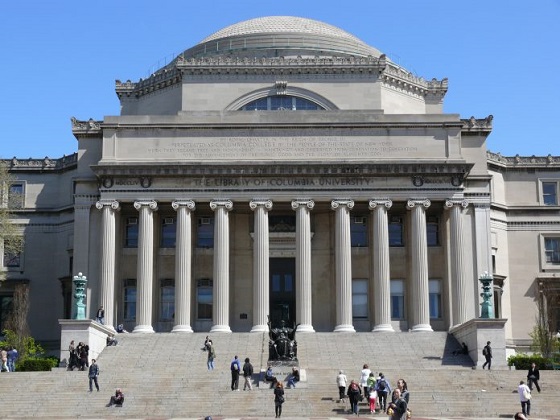
From Heartland Daily News
Columbia University locked down its campus Tuesday to everyone but essential personnel and students after anti-Israel protesters smashed windows and barricaded themselves inside Hamilton Hall early in the morning.
A staff member in the building at the time said he was temporarily taken hostage, The Columbia Spectator reports.
As of 9 a.m. Tuesday, the New York university even barred the media from campus “as a safety measure,” a news update states.
“Access to campus has been limited to students residing in residential buildings on campus and employees who provide essential services to campus buildings, labs, and residential student life,” according to the announcement.
The Spectator reports more:
The [lock down] comes six hours after around three dozen protesters occupied Hamilton Hall, pledging to remain inside the building until the University meets its stated demands, including divestment from Israel, financial transparency, and amnesty for students detained and suspended in the mass arrests on April 18.
Protesters sealed off the building minutes after entry, barricading the doors with wooden tables, chairs, and zip ties. Demonstrators outside moved the metal tables outside Hartley Hall to the front of the doors, securing them shut with ropes and zip ties.
A facilities worker said he was temporarily held hostage but allowed to leave about 10 minutes later, according to the student newspaper. Later, two other janitors said they also were temporarily held hostage, according to Fox News.
Columbia has fallen
Pro-Palestinian protesters have reportedly taken a building by force and barricaded themselves inpic.twitter.com/fhFbOmZVwY
— The College Fix (@CollegeFix) April 30, 2024
Several students also reported being assaulted by protesters trying to enter the building, according to an X video by freelance reporter Jessica Schwalb.
Student is assaulted by mob. @NYPDDaughtry Many students have called the police but where are you???
We are in danger. pic.twitter.com/ghZWuMgb6y
— Jessica Schwalb (@jessicaschwalb7) April 30, 2024
Pro-Palestinian protests have been going on for weeks at Columbia, with some demonstrators establishing a “Gaza Solidarity Encampment” on the lawn.
On Monday, university spokesperson Ben Chang said students began receiving suspension notices after ignoring repeated warnings to leave their encampment by 2 p.m. that day.
“Students who agreed to leave and sign a form committing to abide by University policies will be allowed to complete the semester,” Chang said in a campus update.
Some faculty members, many of them wearing masks, joined the protesters just ahead of the 2 p.m. deadline, locking arms to form a human chain around the encampment, according to videos on X.
Unbelievable. Columbia faculty lock arms to prevent police from clearing the encampment. Why do they still have jobs? pic.twitter.com/XrKlNCOx3q
— Ian Miles Cheong (@stillgray) April 29, 2024
As of Tuesday morning, the pro-Palestinian demonstrators continue to occupy the building. The Spectator reports New York Police Department officers have been at the scene since about 12:45 a.m. but have not entered the building.
conflict
Col. Douglas Macgregor torches Trump over support for bill funding wars in Ukraine and Israel

From LifeSiteNews
By Frank Wright
” He’s essentially throwing his principles overboard and his supporters under the bus.
If I were working for him right now and he were president I would have advised him under no circumstances to support the bill and instead focus our attention on the on the borders of the United States [and] restoring the rule of law. “
With another interview appearance, retired Colonel Douglas Macgregor has warned the United States is no longer in control of the wars it continues to fund, against overwhelming public opposition.
According to Macgregor and host Clayton Morris, a former Fox News anchor, “70 percent of the American people” now oppose sending money to fund wars present and future in Ukraine, Israel and Taiwan.
What is more, Macgregor says that given Donald Trump’s “catastrophically stupid” support of the $95 billion funding bill passed by Congress on April 20, if he were working for Trump now he “would have to resign.”
Speaking of Trump’s approval for the bill, Macgregor said, “What he did… is essentially align himself with the money pigs in Washington who were interested in everything other than the American people.”
Macgregor’s verdict on Trump was damning:
He’s essentially throwing his principles overboard and his supporters under the bus.
If I were working for him right now and he were president I would have advised him under no circumstances to support the bill and instead focus our attention on the on the borders of the United States [and] restoring the rule of law.
So why did Trump go ahead and endorse billions more for two wars which are widely acknowledged as having been disastrous – if not genocidal – failures?
“I think Mr. Trump wants desperately to be president,” explained Macgregor. “So, he is turning to everyone and anyone who has money willing to support him and will promise to do so – whatever they’re asking.”
The retired colonel is the CEO of Our Country, Our Choice, an organization which appeals to Americans “to come together to save America.” It’s motto is “Truth sets you free,” echoing the Christian roots of the American dream which is, according to Macgregor, verging on becoming a nightmare.
Macgregor is not afraid to speak uncomfortable truths, whether about his former president, or about the perilous state of a world on the brink of war. He considers Trump’s decision “outrageous “ and says Trump has “made a bad mistake… I think it will haunt him.”
Instead of supporting the funding bill, Macgregor says Trump “should have stood with the 21 members” of Congress who opposed it because, “quite frankly, most of America stands with those 21 members.”
Macgregor is aware that this is about political power, not the interests of the people – whether they be in the U.S. or in Ukraine. He is practically alone in noting that throughout the proxy war, the Ukrainian people seldom get a mention.
“No one expresses any interest in what’s happened to the Ukrainian people,” he said, before citing the horrendous toll of deaths and injuries which has devastated the Ukrainian populace.
“Ukrainians are exhausted. They’re tired of this war. They’ve lost now, we think, 600,000 dead and another million or two wounded.”
Added to these sobering figures is the fact that much of the surviving population has fled.
“Millions have left. The country is destroyed. It desperately needs peace.”
As the Washington Post claimed last December, up to “90 percent” of the money given in “aid” stays in the U.S. anyway. On April 21, the U.K.’s Financial Times concluded that the aid package “would not stop Russia.” On April 23, it reported that Ukraine now “pressures draft-age men abroad to join the war effort,” following a Politico report of last month titled “Draft-dodging plagues Ukraine as Kyiv faces acute soldier shortage.” The report cites the BBC in claiming up to “650,000 military aged men have fled the country” in the past two years, despite a law forbidding them to do so.
Former humanitarian volunteer and Catholic convert Ryan Miller told LifeSiteNews last month of how human traffickers operate freely on the Ukrainian border, preying on women and children separated by this law from their husbands and fathers.
This news portrays a grim reality behind the Ukraine flag-waving seen on the United States House floor. It is a narrative of ugly truths supporting Macgregor’s assessment of a war he has consistently claimed could never have been won. Against the notion that America must “stop Putin,” he said:
We’ve never had any option other than to accept his [Putin’s] victory because, as we said from the very beginning, Ukraine had no more chance against Russia than Mexico would have against us in the United States.
The second war funded in this package has, according to Israeli media, already ended in “total defeat.”
Israeli newspaper Haaretz published this story on April 11, “Saying What Can’t Be Said: Israel Has Been Defeated – a Total Defeat”
The story by Chaim Levinson displayed a remarkable level of candor.
“The war’s aims won’t be achieved, the hostages won’t be returned through military pressure, security won’t be restored and Israel’s international ostracism won’t end.”
Macgregor shares this assessment, which he couples with a warning that “Biden is not in control” of events in the Middle East, and neither is the U.S. “Mr. Netanyahu is in control. And he cannot back down. If he does not escalate, he is finished.”
Macgregor warns that the “world has turned against Israel, we are increasingly isolated, but we are not in control. Mr. Netanyahu owns us. What do we do?”
Macgregor stressed that U.S. backing for Netanyahu is the result of his having more influence in the U.S. government than the president. This means, in effect, that the U.S. is funding a man whose only option is to escalate to war with Iran.
“Mr. Netanyahu is in a difficult position,” explains Macgregor, “we can’t help him. All we can do is tell him to back down. He can’t back down.”
“Netanyahu has to escalate or he’s finished. So I don’t think we’ve seen the last of the Israeli-Iranian confrontation.”
Warning that Netanyahu is likely going to “kill women, children, and men with no connection to Hamas in Gaza’s Rafah area,” he foresees a real potential for the outbreak of a major regional war involving the U.S.
I don’t think we’ve even seen the beginnings of what could happen in the region because, if anything, we’re seeing more and more and more solidarity across national lines inside the Muslim world.
As this develops, Macgregor claims even the Western military alliance is leaderless:
NATO is essentially a battleship with no one on the bridge and engines that don’t power the ship anymore. It’s adrift.
He says in previous years the “stupid comments” of French President Emmanuel Macron to threaten to send French troops to Ukraine would have been unimaginable. Responding to claims that French and American soldiers are now on the ground in Odessa in Ukraine, he replied, “A Russian this morning contacted me… and said that he sees no French or American troops in Odessa.”
His relief at this news was tempered by a stern reminder that such an action would lead to a U.S. war with Russia, which has the largest nuclear arsenal on earth.
I sincerely hope that that condition does not change. If it does, then I think the Russians will accelerate all of their movements and we will find ourselves at war with Russia unnecessarily.
He asks, “For what particular purpose?”
The direct funding of two major flashpoints for a global war left the host, Clayton Morris, unable to explain Trump’s support of the move.
“This rises to the level of coming out and supporting the COVID vaccines,” he said, speaking of Trump’s recent praise for the mRNA injections.
“I think there was a lot of MAGA Republicans who said ‘Wait a second – did Trump just praise COVID vacc [sic] – wait did I hear that right?’”
The news of Trump’s backing for the war funding has left Morris equally baffled, as he quoted Trump’s recent comments:
In the same week [Trump] says we’ve spent 7 to 9 trillion dollars on boondoggle wars in the Middle East… where we have blood on our hands… we’ve got nothing but blood and misery, we should have never supported those Wars.
He added, “and then four days later… supporting speaker Johnson supporting all of this money to Ukraine and Israel and Taiwan? I just can’t wrap my head around it.”
For Colonel Macgregor, this is a decision which will follow Trump long into the future.
“So we have to be realistic about this whole business. He’s let a lot of people down. I think it will come back to haunt him.”
The dangerous business of funding death no longer haunts only the politicians – like Trump and Netanyahu – who rely on it to secure their power. If Macgregor is right, the world may be engulfed in a nuclear war as a result of these bargains with the devil.
-

 Education2 days ago
Education2 days agoSupport a young reader through the Tim Hortons Smile Cookie campaign
-

 Business2 days ago
Business2 days agoWEF panelist suggests COVID response accustomed people to the idea of CBDCs
-
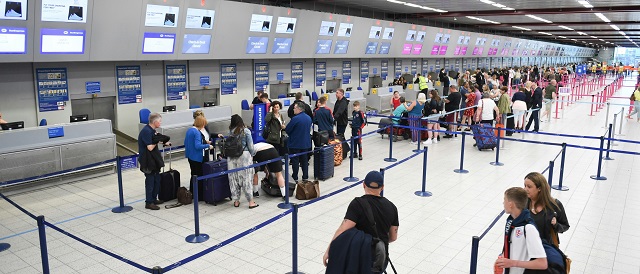
 illegal immigration2 days ago
illegal immigration2 days agoFlight Docs Reveal Which Cities Are Receiving Migrants Under Biden’s Parole Program
-
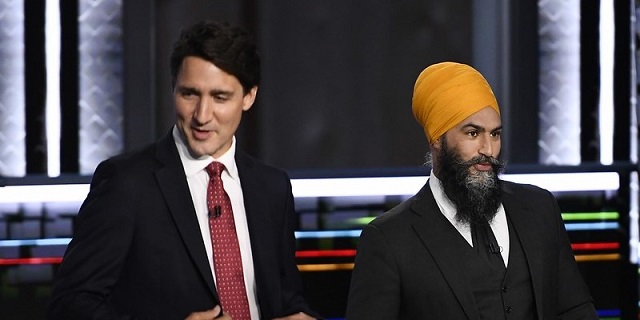
 Fraser Institute2 days ago
Fraser Institute2 days agoCanada can solve its productivity ‘emergency’—we just need politicians on board
-
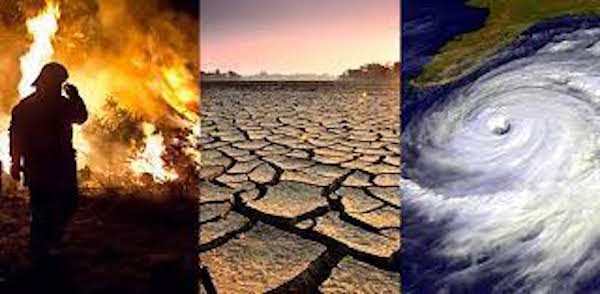
 Environment2 days ago
Environment2 days agoJournalism Misrepresent Climate Science
-
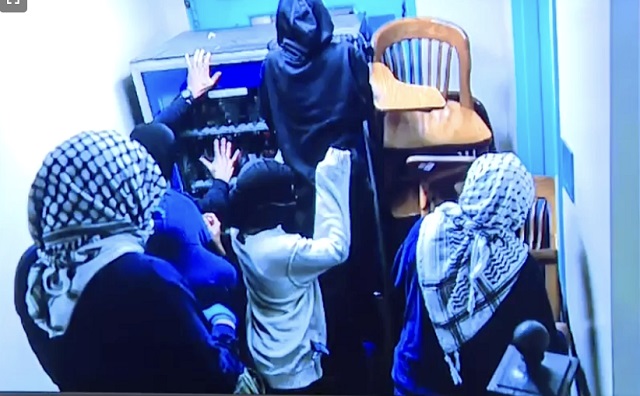
 International2 days ago
International2 days agoNYPD storms protest-occupied Columbia building, several arrested
-
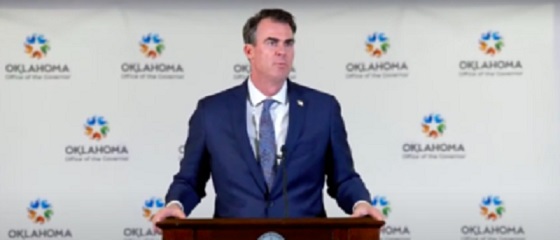
 illegal immigration2 days ago
illegal immigration2 days agoOklahoma Just Became The Latest State To Take Immigration Enforcement Into Its Own Hands
-
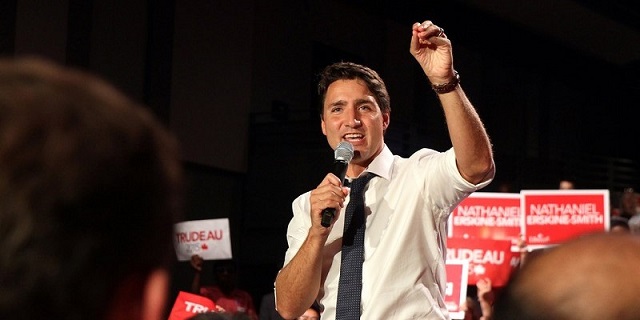
 Economy2 days ago
Economy2 days agoToday’s federal government—massive spending growth and epic betting





